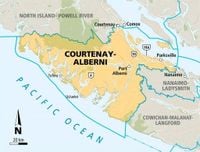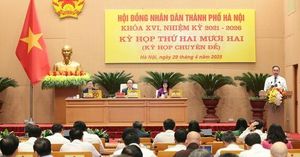WINNIPEG — As the federal election voting wraps up across the country on April 28, 2025, political analysts are observing significant shifts in voter sentiment, particularly in Manitoba. According to Christopher Adams, a political analyst from the University of Manitoba, the urban seats in Manitoba could see some tightly contested races. Just a few months ago, polls indicated that several Liberal-held seats in Winnipeg were likely to switch to Conservative. However, with the New Democratic Party (NDP) experiencing a decline in opinion polls and the Liberals gaining traction, the political landscape is changing rapidly.
Adams noted that incumbent New Democrats, such as Leah Gazan in Winnipeg Centre and Niki Ashton in northern Manitoba, are now expected to face intense competition. One key riding to watch is Winnipeg South, which has a notable history of electing a member of the governing party in every federal election since 1988. The current incumbent, Terry Duguid, a Liberal cabinet minister, has held the Winnipeg South seat since 2015. He is now facing challenges from Conservative candidate Janice Morley-Lecomte and NDP candidate Joanne Bjornson.
Adams remarked, "As I’ve often said, as Winnipeg South goes, so goes the nation." This statement underscores the importance of this riding in reflecting broader national trends. In addition to Winnipeg South, other races are also shaping up to be rematches. For instance, Leila Dance won the Elmwood-Transcona seat for the NDP in a byelection last September, and now Conservative Colin Reynolds, who lost by 1,100 votes, is running again. Ian MacIntyre represents the Liberal Party in this riding.
In Winnipeg West, Conservative incumbent Marty Morantz is again facing Liberal Doug Eyolfson. Morantz won by a narrow margin of less than 500 votes in the 2021 election, while Avery Selby-Lyons is running for the NDP. The situation is particularly precarious for Niki Ashton, who has represented the northern riding of Churchill-Keewatinook Aski since 2008. Adams pointed out that low NDP polling numbers nationally could pose a significant threat to her re-election, particularly with Rebecca Chartrand from the Liberals finishing a close second in the 2015 election. Lachlan De Nardi is also vying for the seat as the Conservative candidate.
Meanwhile, in St. Boniface-St. Vital, there is guaranteed to be a new face in Parliament as former Liberal cabinet minister Dan Vandal is not seeking re-election. The seat has seen representation from both Liberals and Conservatives in recent decades. Similarly, Conservative Larry Maguire has announced he will not run again in Brandon-Souris, a seat that has historically been a Conservative stronghold.
Shifting focus to New Brunswick, early trends suggest a robust performance for the Liberal Party, with the Conservatives also showing strength in key ridings. The Greater Moncton area is particularly significant in understanding the political dynamics at play. CBC projects that incumbent Liberal MP Ginette Petitpas Taylor will win the Moncton-Dieppe riding, maintaining a significant lead over her competitors, which include Conservative Jocelyn Dionne, NDP’s Serge Landry, and Green Party’s Marshall Dunn.
In the Beausejour riding, also centered around Moncton, another Liberal incumbent, Dominic LeBlanc, is expected to win re-election. Early results indicate LeBlanc has a strong lead, with Conservative candidate Nathalie Vautour emerging as his closest rival. Other candidates in this riding include Alex Gagné from the NDP, Josh Shaddick from the Green Party, Eddie Cornell from the People’s Party, and Libertarian Donna Allen.
In the Fundy Royal riding, CBC has projected Conservative incumbent Rob Moore to secure another term, with Liberal candidate Bill Kudla trailing behind. The remaining candidates include NDP’s Cindy Andrie, Green Party’s Hans Johnsen, and People’s Party candidate Alastair MacFarlane.
As results continue to come in, the political landscape is becoming clearer, but it remains dynamic. The potential for a two-party dominance in New Brunswick is evident, with smaller parties like the NDP, Green Party, and People’s Party struggling to make significant inroads.
Turning our attention to Quebec, voters flocked to the polls for the 2025 election, which saw all 78 of the province's seats up for grabs. The results from Quebec are still pending, but the province's political landscape is historically complex, often reflecting broader national trends.
In British Columbia, NDP incumbent Gord Johns acknowledges that the party seems to be losing momentum in the federal election. However, he maintains that national trends have little impact on his campaign in Courtenay-Alberni, which he believes remains a two-horse race between the Conservatives and his party. Polling aggregator 338Canada.com indicates that the NDP is projected to receive around half the votes they garnered in the 2021 federal election, with Courtenay-Alberni listed as "likely" to flip to the Conservatives.
Despite these challenges, Johns appears undeterred, reporting that his campaign has received more than 1,300 lawn sign requests—double the number from the last election. He highlighted the significant increase in federal investment in the riding since he took office, noting, "The riding has had a 12-fold increase in federal investment since I was elected, from an average of $1.7 million a year to $18 million annually in infrastructure funding." This increase in funding has been a focal point of his campaign.
Johns' main challenger, Conservative candidate Kris McNichol, emphasizes his business background as a reason for voters to support him. At 51 years old, McNichol has extensive experience in the aquaculture sector and has various business interests in Parksville. He expressed skepticism about the polls, stating, "I don’t believe one poll out there." McNichol is also keenly aware of the housing challenges facing younger Canadians and aims to be a voice for their concerns.
As the election unfolds, the dynamics of voter sentiment and party positioning will continue to evolve. The implications of these elections will resonate far beyond the immediate outcomes, shaping the political landscape in Canada for years to come.





